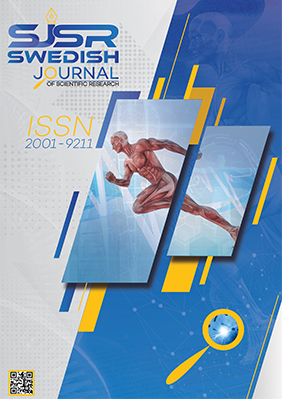SWEDISH JOURNAL OF SCIENTIFIC RESEARCH
SJSR January issue2020 | Issue 1 / JAN |
|---|---|
|
P. 1 - 6
SJSR-000321
|
The purpose of the study was to identify the levels of narcissism and self-esteem and their potential relationship among soccer players in the West Bank, Palestine. Methods: A total of 210 soccer players (aged 05-20 years) from three teams (professional and first- and second-division) in the West Bank were participated in this study. Data level of narcissism, and self-esteem, and their relationship with the potential of soccer players were collected via Emmons’ four Narcissistic Personality Inventory (NPI) dimensions (1984) and the Rosenberg Self-Esteem Scale (1965). Results: Seventy-five percent of the players were evaluated as having a high level of narcissism more than self-esteem (62.1%). Also, result showed a positive relationship between narcissism and self - esteem among the players of the Palestinian football league, which is reflected in their level of performance. Moreover, variables of experience, playing position, and league level have no impact on players’ self-esteem. However, forwards demonstrate more narcissistic than midfielders.
Awad Bdir1, et al, 2020. The Relationship between Narcissism and Self-esteem among Football Players in the West Bank, Palestine . Swedish Journal of Scientific Research.; 7(1):1-6.
|
|
P. 1 - 5
SJSR-000322
|
The purpose of the study was to determine the effect of height weeks of coordination training program on performance of young soccer players. Methods: Subjects were divided into two groups: experimental group (coordination training) and a control group (regular training). The coordination training group performed in height week coordination training program and the control group did not perform any coordination training techniques. Results: Significant increase of physical performance after Coordination training program: improvement of Speed (∆9.11 %), and Fitness (∆9.33 %), and flexibility (∆104.17 %), and endurance (∆10.37 %), and scrolling (∆125.79 %), ball feeling (∆36.820%), running with the ball (∆6.53%), and the accuracy of the scoring (∆95.47 %), and hitting the ball with the head for the farthest distance (∆37.17 %). Also, results showed a significant increase on physical performance during regular training program less than coordination training program: Speed (∆4.04 %), Fitness (∆2.27 %), flexibility (∆37.19 %), endurance (∆2.44 %), and scrolling (∆60.01 %), ball feeling (∆4.98 %), running with the ball (∆0.352 %), the accuracy of scoring (∆35.31 %), and hitting the ball with head for the farthest distance (∆8.98 %). Conclusion: The results of this study show that coordination training program can be more improvement than regular training for the youngest soccer players. Mohanad Omar 1, et al, 2020. The Effect of Using Coordination Abilities on Some Physical and Skill Variables of Soccer Beginners in Palestine. Swedish Journal of Scientific Research.; 7(1):1-5.
|
|
P. 1 - 4
SJSR-000323
|
This study aimed to identify the relationship between the level of physical fitness and academic achievement among students of Palestine Technical College in Ramallah, in addition to determining their difference with place of residence, academic level, and academic specialization. A total of 128 female students (aged19-20 years) were participated in this study. The present study showed a positive correlation was proved between physical fitness tests and academic achievement among student’s girls. Also, a significant difference was detected between the average fitness level and specialization or academic level. However, no significant differences were showed between the average fitness level and place of residence.
Fatema Abualhayja 1, et al, 2020. Associations between Fitness Level and Academic Achievement among Female Students of Palestine. Swedish Journal of Scientific Research.; 7(1):1-4.
|
|
P. 1 - 4
SJSR-000324
|
This study aimed to examine the effect of a 8-week high-intensity intermittent training (HIIT)-based running plan with different recovery modes (passive, active) on anthropometric indices, athletic performance, and physiological responses, during a Vameval test and 30–15 intermittent fitness test, before and after the HIIT period. Twenty eight subjects were matched into 3 groups: active recovery group (ARG), passive recovery group (PRG), and control group (CG). The CG was asked to maintain their normal training routines. HIIT program improved significantly VMA and VO2max regardless of the mode of recovery. Also, the results of present study showed that HIIT program can increase aerobic performance without having any change on RPE, heart rate and lactate concentration.
Nidhal Jebabli1, et al, 2020. Performance for Short High-intensity Interval Training Program: Active Recovery vs. Passive Recovery . Swedish Journal of Scientific Research.; 7(1):1-4.
|


